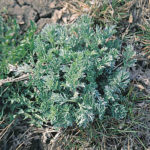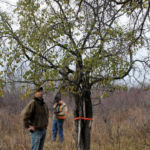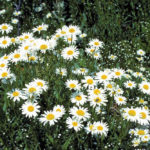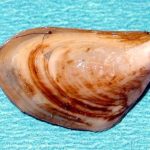Reading Time: < 1 minute A tough, semi-woody perennial plant native to Europe and Asia, absinthe wormwood typically grows in stems and forms in a clumping habit. The most distinguishing feature of the plant is its finely divided leaves combined with a silvery-grey colour. Absinthe wormwood also has a very strong and distinct odour which is very similar to sage. […] Read more

You won’t raise a glass to this invasive weed
Noxious Weeds: Absinthe wormwood

The threat of invasive mussels draws ever closer to Alberta
Water officials on high alert after positive samples for larval mussels were found in two nearby Montana reservoirs last year
Reading Time: 4 minutes Lakes closed to watercraft; shores fouled with sharp shells and a rotting mollusk smell; millions of tax dollars going to clean up irrigation and hydro-electric infrastructure — that’s the future if quagga or zebra mussels find their way into the province. For decades, Alberta has been protected by a buffer of mussel-free provinces and states […] Read more

This tree is also a noxious weed
Reading Time: < 1 minute Common buckthorn, otherwise known as European buckthorn, has been found in two locations in Alberta — in Edmonton along the North Saskatchewan River and in Stettler County. It was originally brought to North America from Eurasia as an ornamental, but soon spread throughout the continent. High seed production and excellent tolerance to Canada’s climate allow […] Read more

Authorities up efforts in the battle to keep out invasive mussels
More inspections, tougher enforcement, and lots of education key to keeping Alberta waterways clear of quagga and zebra mussels
Reading Time: 3 minutes The provincial government and irrigation districts are ramping up their efforts to keep invasive quagga and zebra mussels out of Alberta. Along with more watercraft inspections, the province is also stepping up enforcement — and boaters who fail to stop at an inspection station face a fine of up to $100,000 or 12 months in […] Read more

Noxious weed found throughout Alberta
Noxious Weeds: Wooly Burdock
Reading Time: < 1 minute Woolly burdock is found throughout Alberta and will grow in most soil types. It prefers moist, loamy, and well-drained soils which are in direct sunlight. This noxious weed is commonly found on disturbed sites, but has also been found growing in gardens for herbal use. Woolly burdock can only reproduce by seed, but is self-fertile […] Read more

Ox-eye daisy not just a pretty wildflower
Reading Time: < 1 minute Ox-eye daisy is a noxious weed that has been spotted throughout Alberta, especially in central and southwest areas of the province. It commonly grows along roadsides, waterbodies, fields and pastures, forest openings, disturbed areas, and urban areas. This weed looks similar to scentless chamomile and is often not perceived as an invasive plant because it […] Read more

Beware of this ornamental escapee
Reading Time: < 1 minute It has a beautiful yellow showy flower, but do not let that fool you — Bighead Knapweed is highly invasive. This invader is a long-lived perennial native in eastern Europe. It produces an abundance of seeds, which have bristles that can easily attach to animal fur. It can be found in flower beds throughout Alberta. […] Read more

This tenacious invader is hard to defeat
Reading Time: < 1 minute White cockle has strikingly lovely white flowers and the fuzzy, almost furry opposite leaves give it a distinctive appearance. It is a member of the Pink family — it looks like pinking shears gave the five petals their deep notches. The Pink family includes chickweed and night flowering catchfly — catchfly is often mistaken for […] Read more

Western Canada unites in fight against invasive species
Joint agreement will boost fight to keep zebra and quagga mussels out of Alberta
Reading Time: < 1 minute A joint agreement among Alberta, British Columbia, Saskatchewan, Manitoba, and Yukon tightens the grip on invasive species. The Inter-Provincial Territorial Agreement for Co-ordinated Regional Defence Against Invasive Species is a step towards better co-ordination among jurisdictions on both prevention and co-ordinated response if invasive species are detected in Western Canada. The initial scope of this […] Read more

Keeping province free of invasive mussels
Zebra and quagga mussels could quickly devastate Alberta’s irrigation infrastructure
Reading Time: 2 minutes Zebra and quagga mussels are small freshwater, clam-like species that pose a significant threat to Alberta’s waterways and irrigation systems. “The concern with zebra and quagga mussels is that they multiply very quickly and can attach and accumulate on any submerged surface in the water, and could clog up water-related infrastructure such as irrigation pipelines […] Read more

